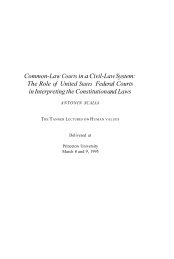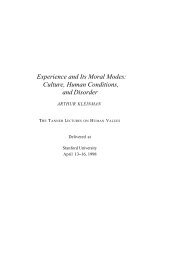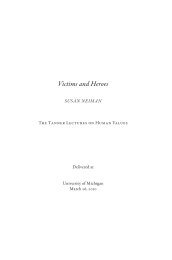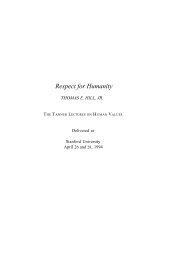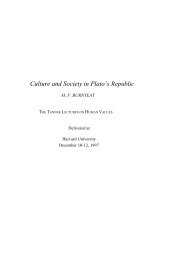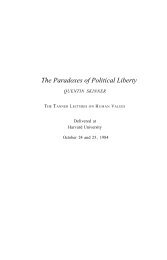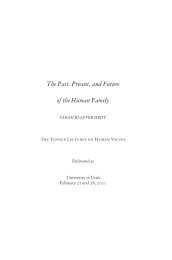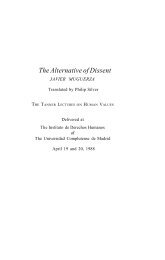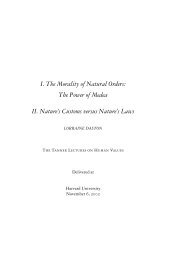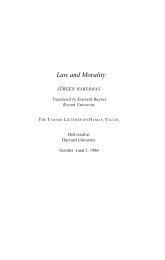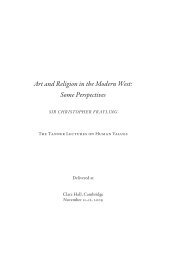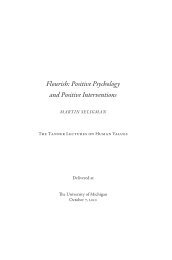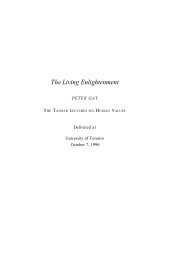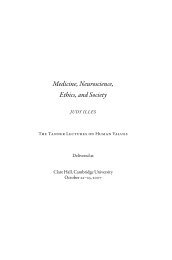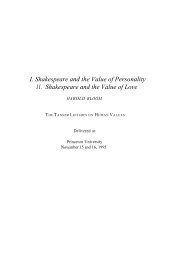Slote, Michael - The Tanner Lectures on Human Values
Slote, Michael - The Tanner Lectures on Human Values
Slote, Michael - The Tanner Lectures on Human Values
Create successful ePaper yourself
Turn your PDF publications into a flip-book with our unique Google optimized e-Paper software.
86 <str<strong>on</strong>g>The</str<strong>on</strong>g> <str<strong>on</strong>g>Tanner</str<strong>on</strong>g> <str<strong>on</strong>g>Lectures</str<strong>on</strong>g> <strong>on</strong> <strong>Human</strong> <strong>Values</strong><br />
nor even the playing-it-safe so characteristic of prudence in the<br />
ordinary sense. But the habit of optimizing does share the aspect<br />
of unsp<strong>on</strong>taneous and c<strong>on</strong>strained living that is characteristic of<br />
these other traits, and it is in all these cases a c<strong>on</strong>ceptual fact, not<br />
an accidental psychological generalizati<strong>on</strong>, that these negative features<br />
should attach to what are sometimes presumed to be virtues.<br />
We, to some extent, feel sorry for, think less well of, some<strong>on</strong>e<br />
lacking in sp<strong>on</strong>taneity, and the optimizing individual, who lacks<br />
sp<strong>on</strong>taneity in a very high degree, can hardly seem admirable<br />
when regarded under that aspect. But that is not all.<br />
<str<strong>on</strong>g>The</str<strong>on</strong>g> optimizing pers<strong>on</strong> is possessed of other negative features<br />
that further serve to undercut our antecedent sense that optimizing<br />
rati<strong>on</strong>ality is a desirable or admirable human trait. <str<strong>on</strong>g>The</str<strong>on</strong>g> optimizing<br />
individual - again, as a matter of c<strong>on</strong>ceptual necessity,<br />
not of accidental psychology - seems lacking in self-sufficiency.<br />
Now self-sufficiency as I shall be describing it is a much-ignored<br />
trait, partly, I think, because the claims of self-sufficiency were so<br />
thoroughly overemphasized and exaggerated by philosophers in<br />
the ancient world. <str<strong>on</strong>g>The</str<strong>on</strong>g> Stoics in particular exalted self-sufficiency,<br />
autarkeia, to the status of an absolute and practically exclusive<br />
standard for evaluating human good and virtue, and we have<br />
every reas<strong>on</strong> to shy away from their excesses. For the Stoic, the<br />
wise man or sage would be absolutely self-sufficient in his wellbeing,<br />
depending neither <strong>on</strong> loved <strong>on</strong>es nor <strong>on</strong> the fortunes of this<br />
world for his ultimate happiness. Nothing subject to loss or risk<br />
can feature in such a c<strong>on</strong>cepti<strong>on</strong> of happiness. But the Stoic ideal<br />
is not ours, and we have grown wary, and more than wary, of<br />
attempts to seal off human excellence or well-being from the risks<br />
and taints of the world, and of our less-than-ideal human nature. 7<br />
We are very much in danger, as a result, of throwing out the baby<br />
with the bathwater and failing to recognize elements in the Stoic<br />
ideal that touch us very deeply and cannot be characterized as<br />
7 On this topic, see Goods and Virtues, ch. 6



